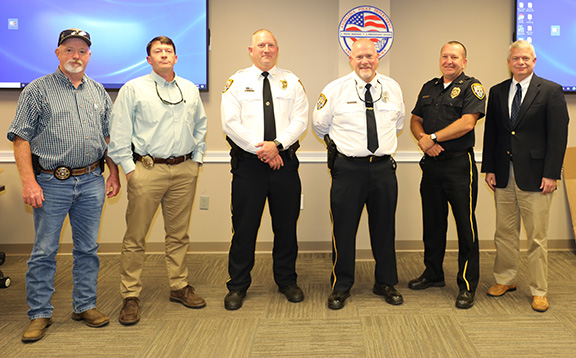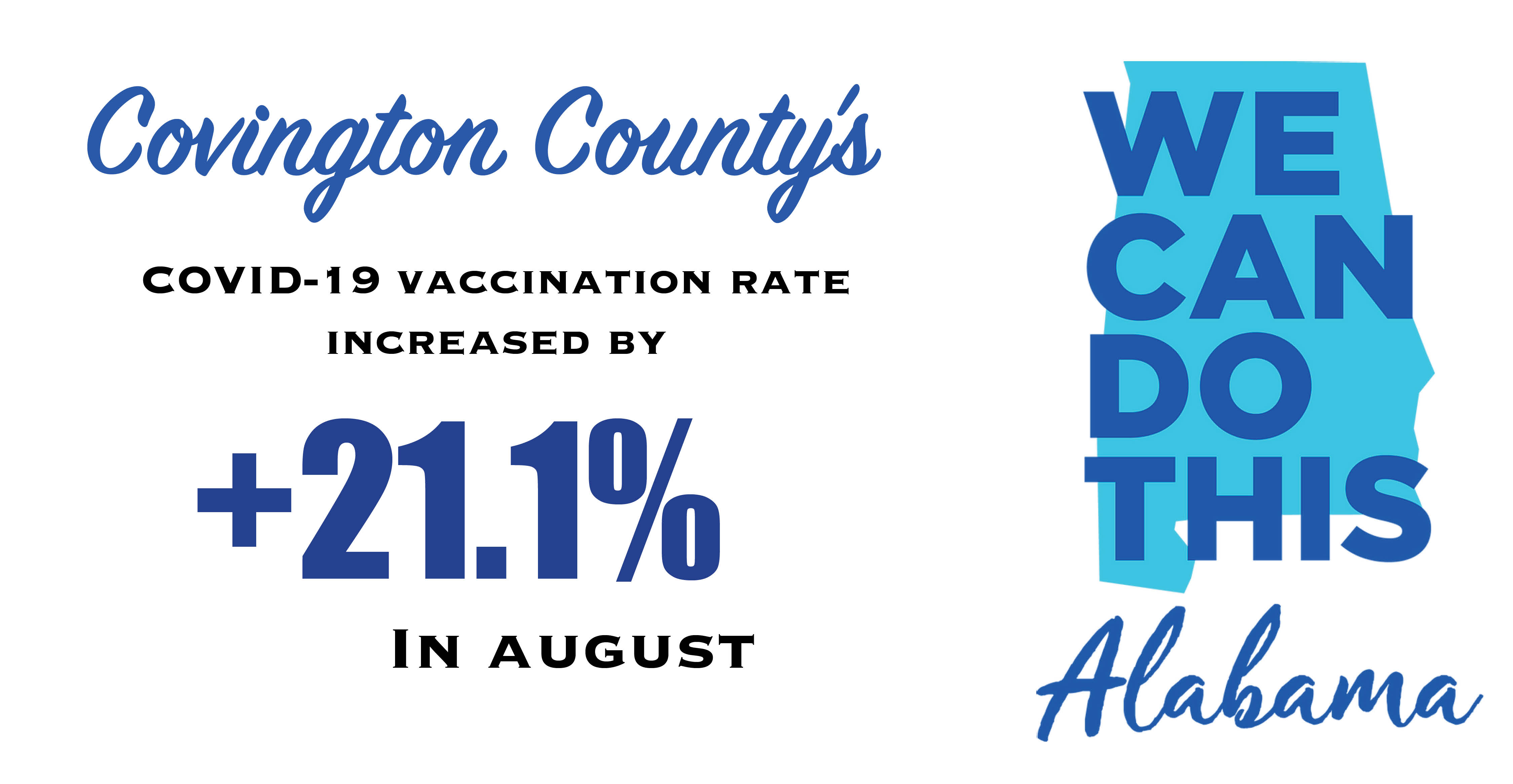In some ways, Jamey Wismer and Brett Holmes have been playing “follow the leader” for most of their adult lives.
Wismer began his law enforcement career as a Covington County jailer, back when the jail was located behind the courthouse. He moved to Troy to complete his degree at Troy University, and went to work for the Troy Police Department.
Likewise, Holmes began his career as a jailer, but at the newer jail, located behind the county administration building.
In 2000, Wismer moved home to Opp to represent the Opp Police Department on then brand-new 22nd Judicial Circuit Drug Task Force.
“We didn’t really know what we were doing,” Wismer recalled recently of the early DTF days. “We winged it until we could figure it out.”
Among Wismer’s co-workers then was a co-worker now, Paul Dean. Both are captains at the Andalusia Police Department.
“We were getting multiple meth labs every day,” Dean recalled. “It was really a job where you were on call 24 hours a day.”
They didn’t realize the inherent danger in being exposed to meth labs until Dean went to a special school.
“We didn’t know what we didn’t know,” Dean said, adding that the men had been exposing themselves to potentially lethal chemicals daily.
In the beginning, the DTF members were assigned to work drug cases, but were often called to the scenes of violent crimes. The first team members included Mark Odom, who now directs the DTF. Ben Bowden – who is now a circuit judge – prosecuted their cases.
All of their cases were memorable, Wismer said.
“One that was significant was finding more than 1,000 pounds of meth oil,” he said. “That was pretty big for our county in task force days.”
But all of the cases were significant, he said.
“We were hitting three and four labs a night, chasing our tails and working meth,” he recalled.
It was at about that time that Brett Holmes moved from the county jail to become a deputy sheriff. For a young officer, it appeared that the DTF members were having the most fun.
Wismer and Dean recalled investigations when they were stuck at the scene for hours. Holmes – whether on or off duty – would show up with a bag of hamburgers.
Paul Hudson – who currently serves as chief of the Andalusia Police Department – also joined the DTF.
“We had a great time doing what we were doing,” Wismer said. “We had a lot of laughs, but we got a lot of work done. Those are the fond times to look back on.”
One morning, Wismer answered the phone and responded to then-District Attorney Eugenia Loggins’ request that he come by her office. When he returned, his co-workers were preparing to serve a warrant for the Customs Service.
Paul Dean explained it this way: When the Drug Enforcement Agency (DEA) calls you, you’re dealing with a national case. When you work with the Customs Service, it’s international and it’s going to be big.
Still, the young officers weren’t quite prepared for what happened. The suspect did not come to the door, but he did shoot. The officers took what little cover they could find. Wismer was hiding as much of himself as he could behind a rock.
It was in the midst of that drama that he decided to break the news, his co-workers recalled. From his position behind the rock, he announced, “I’ve been offered a new job, and I believe I’m going to take it.”
The new job was as an investigator for the district attorney’s office. From their own partially-hidden positions, his co-workers and friends asked him why.
“Because you never hear of Gary Wayne being shot at,” he quipped, referring to Gary Wayne Hutcheson, then an investigator for the DA’s office.
Meanwhile, Holmes had become a Covington County deputy who thought the DTF agents were having all of the fun. He’d often appear at scenes they couldn’t leave with a bag of hamburgers. Not long after Wismer moved to the DA’s office, in 2003, Holmes was hired by the Opp Police Department and assigned to the Drug Task Force.
Five years later, a familiar thing happened. Wismer moved to Pardons and Paroles, and Holmes was hired as an investigator for the District Attorney’s office.
Two years ago, Wismer left Pardons and Paroles to become Capt. Wismer of the Andalusia Police Department.
“We brought him in to oversee investigations and to help it run more smoothly,” Chief Hudson said.
Now, after 27 years in law enforcement, Wismer is retiring to be administrator and director of senior adults at his church, Westview Baptist in Opp. And, as in the past, Holmes has moved from the DA’s office to the APD, where he is now “Capt. Holmes,” in charge of investigations.
Chief Hudson said, “I know Brett, and as everybody knows, we are brothers-in-law. He has the experience and knowledge to come in, take that position, and build on what Jamey has done.”
If the old friends joke that “Brett is always the clean-up guy for Jamey,” it’s all in good fun.
Wismer said he can remember his impressions of Holmes as a young officer.
“I remember thinking, ‘That dude is gonna be great.’ He’s relentless when he gets it in his mind to solve a case. You don’t see that in guys every day.”
While he’s leaving law enforcement, Wismer said he believes he’ll continue to serve the community in his new role.
“I’ll still be serving folks, but hopefully it’s folks who will be smiling when they see you coming,” he said.
And he feels good about leaving again leaving a job in Holmes’ hands.
Meanwhile, Holmes said he’s a bit surprised to be following Wismer again, but swears it’ll be the last time.
“Honestly, I thought I would retire from the DA’s office,” Holmes said. “I was not looking for a job. I’ve never applied but for one promotion job, and I didn’t get it. Every move I’ve made, someone sought me.”
That’s a hard lesson for young officers to learn, he said.
“Sometimes they think the grass is greener somewhere else. But your work speaks for itself. If you work hard, you don’t have to find that other job. The job will find you.”
Wismer was honored with a retirement reception last week.
The City of Andalusia’s Adult Activity Center and Senior Nutrition staff members are seeking sponsors for their annual Praying Hands program.
The staff organizes the gift drive for senior citizens each fall, making sure that no seniors are forgotten at Christmas.
Adult Activity Center director Sonja Godwin said while the local senior center remains closed due to surging COVID-19 numbers, she and other staff members have remained in touch with clients through the senior adult meal program, which has operated as a drive-through and delivery meal service since 2020.
“Typically, we ask people to come by and pick up an information sheet on a senior from our Praying Hands tree,” Godwin said. “This year, we are seeking helpers to make Christmas special for at least 56 individuals, all of whom are 60 years or older and many are homebound.”
The senior adults were asked to complete questionnaires about their Christmas wishes, and the AAC staff is asking adopters to participate in one of two ways.
“You can call our office at 222-6891 to choose your praying hands revealing a senior’s wishes,” Godwin said. “We ask that you spend no less than $40 per person.”
Alternately, she said, individuals can make a financial contribution and the AAC staff will shop for the senior adults. Gifts should be dropped at the Adult Activity Center no later than Friday, November 19.
For additional information, call Godwin at 222-6891 or email her at .
Both Andalusia Health and Mizell Memorial on Thursday week joined the Alabama Hospital Association in calling for a statewidemoment ofsilencetorememberthemorethan12,000AlabamianslostfromCOVID-19.
Mayor Earl Johnson also called on Andalusians to join in the observance, set for Tuesday, Sept. 7, at noon.
As of Friday afternoon, Alabama had lost 12,394 individuals to COVID-19, according to the Alabama Department of Public Health. ADPH numbers show that 150 of those deaths were in Covington County.
Brian Springate, interim CEO of Andalusia Health, said, “We also want to remember their families, those who are still sickand all of our health care workers who are been caring for them. This disease has caused such devastation and heartbreak for so many Alabamians that we believe this is very much needed. We hope you’ll join us in the moment of silence wherever you are that day and that you’ll pass along this request to your friends, family and coworkers and encourage them to participate as well.”
MitchellMyers,MizellMemorialHospital’schiefclinicalofficer, said, “Theresurgence of COVID-19in ourcommunitycontinuesto stretchalreadythinresourcesandpersonnel.WordscannotexpressthegratitudewehaveforeachemployeeatMizell.Thesacrificesbeingmadebyemployeesindicatesthetruedesiretoserveothersaboveself.Furthermore,thephysicalandemotionalfatiguethishascausedonhospitalstaffshouldnotgounrecognized.SeeingthedevastatingeffectsCOVID-19hasonindividualsandtheirfamiliescanalsoimpacthealthcareemployeeswiththesamemagnitude.Wearetrulyblessedtohavesuchadedicated andcompassionatestaff.”
Mayor Johnson said, “Like communities all around the world, ours has suffered devastating losses as a result of the COVID-19 virus. Taking a moment to remember them, those who continue to fight, and those who have provided professional care for the past year and half is the least we can do to show them our support. I have no doubt Andalusia’s residents will join me in this effort.”
Covington County was one of six counties that posted significant increases in the number of COVID-19 vaccination rates in August following a grassroots effort, We Can Do This Alabama, challenging mayors to increase vaccination rates in their communities.
Andalusia Mayor Earl Johnson accepted that challenge, and on Wednesday was recognized by We Can Do This Alabama for the largest increases in vaccinations.
Also recognized were :
- Mayor Joe Hughes of Locust Fork in Blount County.
- Mayor Chuck Ables of Geraldine in DeKalb County.
- Mayor Yank Lovelace of Brewton in Escambia County.
- Mayor Bob Joslin of Arab; Mayor David Dyar of Boaz; and Mayor Leigh Dollar, Guntersville, all in Marshall County.
- Mayor Charles Andrews of Monroeville in Monroe County.
“We were pleased to learn Wednesday that Covington County had one of the six highest increases in vaccine rates in August,” Mayor Earl Johnson said. “As of Wednesday morning, 39.2% of the county’s population had had at least one dose of the vaccine, and 32.6 percent were completely vaccinated.”
The number of vaccinated people in the county increased by 21 percent in August.
We Can Do This Alabama is a collaborative effort between the Alabama Department of Public Health, the Alabama Hospital Association, Blue Cross and Blue Shield of Alabama, the Alabama Nursing Home Association, the Alabama Primary Health Care Association, the Alabama Chapter-AAP, the Alabama Council for Behavioral Healthcare, the Alabama State Nurses Association, and the Medical Association of the State of Alabama with the goal of increasing COVID-19 vaccinations in Alabama through a grassroots approach.
“We are very grateful to the mayors who participated in the challenge,” said Donald E. Williamson, MD, president of the Alabama Hospital Association. “We urge all mayors and local leaders to continue encouraging vaccinations as this is the most important weapon in stopping the spread of the virus. The leadership of these men and women is critical in ensuring the health and safety of their communities.”
In total, Alabama saw a 14 percent increase in vaccinations from the start of the challenge in early August through Labor Day.
“While those numbers are encouraging, we cannot rest on them,” Mayor Johnson said. “During that same time, there have been 1,168 new cases of the virus in Covington County, and at least 13 more deaths from COVID-19. That number might be higher, as there is a two-week delay between the time of death and an update in the Alabama Department of Public Health’s official numbers.
“We are seeing an increasing number of pediatric cases, and on Wednesday, there were 29 people hospitalized in Covington County with COVID-19. Only three had been vaccinated.”
Johnson also reminded area residents it is not too late to get vaccinated.
“I want to encourage people who have not yet taken time to get vaccinated to do so. We have lost at least 152 residents to COVID-19 since the pandemic began. Scientists and physicians are telling us that until we increase our collective immunity, the virus will continue to mutate and spread. Getting a vaccine is the best way to help stop the spread.”
The mayor also expressed his appreciation to Alan Cotton for his efforts to encourage people to get vaccinated.
“I cannot say enough about what Alan has done. He continues to supply white roses in memory of his wife, Angie, to anyone to participates in a vaccine clinic. Angie died in July, just 10 days after being diagnosed with COVID, and Alan doesn’t want anyone else to face what he and his family have been through.”
COVID-19 vaccinations are available locally at Walmart, CVS, Walgreens, Covington County Health Department, Main Street Faily Care, and Andalusia Regional Hospital.
Andalusia residents who’ve spent any time in the downtown area in the past week should have noticed the addition of Bird, a last-mile electric vehicle being used in more than 100 cities.
The company is based in Los Angeles, California. Faith Wilson is the Andalusia fleet manager.
The vehicles are designed to connect more residents to transit options, reducing congestion and improving the quality of life in cities, according to Bird’s website.
In Andalusia, Wilson is staging the scooters from the new parking lot just south of the Court Square. However, riders don’t have to return the scooters, and it is possible to grab a scooter that’s been left elsewhere in town.
Through the Bird smartphone app, riders can see the closest Bird scooter on a map, unlock it, complete a safety tutorial and ride directly to their desired destination. The cost is $1 to start, with a per-minute fee.
The fleet manager can use a GPS system to track the location of the Birds, and move them when appropriate.
The app can also be used to report “badly parked Birds” or other issues to the fleet manager.
The devices are governed by Alabama Code 32-19, which gives the riders the same rights as bicycle riders. State law requires bicycle riders to ride as near to the ride side of the roadway as practicable, and to follow all safety laws.
The company said the electric scooters can be used on roads and in bike lanes and have a maximum speed of 15 mph. Riders are required to be 18 years old and above to access the scooters.
State law requires persons under age 16 to wear a helmet while bicycling or using the electric scooters.
Andalusia Mayor Earl Johnson said his office has received numerous calls about the vehicles in their first week of operation.
“This is new to Andalusia and people are concerned,” he said. “When you go to big cities, you see these kinds of devices used everywhere. I think it’s neat that they think Andalusia is a cool enough city to have this service.
“With that being said, I’d like to assure local residents that we are working with the company to promote safety,” the mayor said. “State law gives guidelines for these vehicles, just like bicycles. We are asking that drivers follow safety laws, and not block sidewalks when they park the electric vehicles.”





